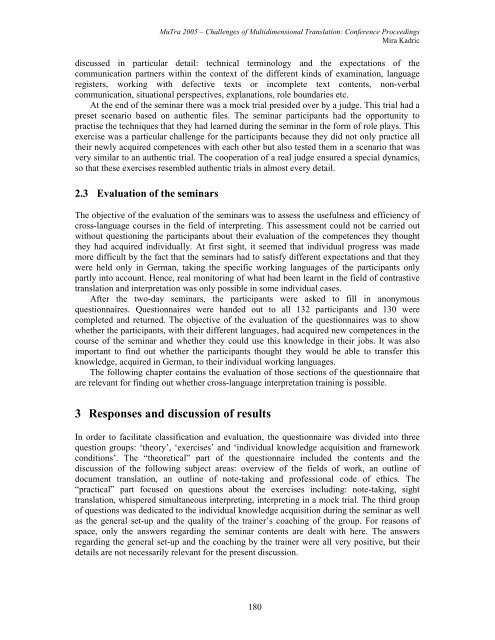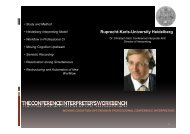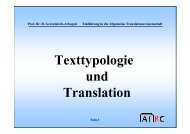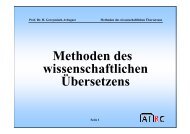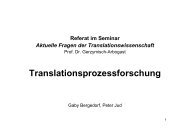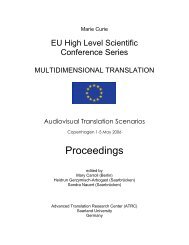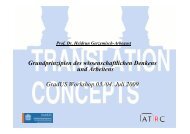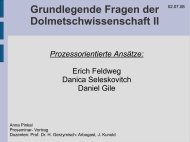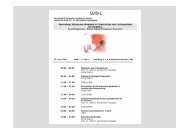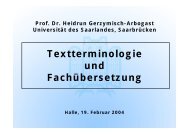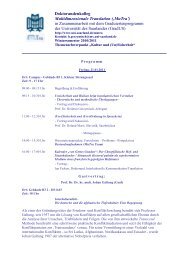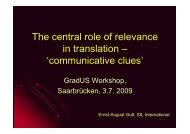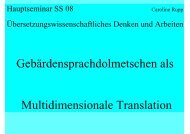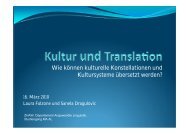Proceedings - Translation Concepts
Proceedings - Translation Concepts
Proceedings - Translation Concepts
You also want an ePaper? Increase the reach of your titles
YUMPU automatically turns print PDFs into web optimized ePapers that Google loves.
MuTra 2005 – Challenges of Multidimensional <strong>Translation</strong>: Conference <strong>Proceedings</strong><br />
Mira Kadric<br />
discussed in particular detail: technical terminology and the expectations of the<br />
communication partners within the context of the different kinds of examination, language<br />
registers, working with defective texts or incomplete text contents, non-verbal<br />
communication, situational perspectives, explanations, role boundaries etc.<br />
At the end of the seminar there was a mock trial presided over by a judge. This trial had a<br />
preset scenario based on authentic files. The seminar participants had the opportunity to<br />
practise the techniques that they had learned during the seminar in the form of role plays. This<br />
exercise was a particular challenge for the participants because they did not only practice all<br />
their newly acquired competences with each other but also tested them in a scenario that was<br />
very similar to an authentic trial. The cooperation of a real judge ensured a special dynamics,<br />
so that these exercises resembled authentic trials in almost every detail.<br />
2.3 Evaluation of the seminars<br />
The objective of the evaluation of the seminars was to assess the usefulness and efficiency of<br />
cross-language courses in the field of interpreting. This assessment could not be carried out<br />
without questioning the participants about their evaluation of the competences they thought<br />
they had acquired individually. At first sight, it seemed that individual progress was made<br />
more difficult by the fact that the seminars had to satisfy different expectations and that they<br />
were held only in German, taking the specific working languages of the participants only<br />
partly into account. Hence, real monitoring of what had been learnt in the field of contrastive<br />
translation and interpretation was only possible in some individual cases.<br />
After the two-day seminars, the participants were asked to fill in anonymous<br />
questionnaires. Questionnaires were handed out to all 132 participants and 130 were<br />
completed and returned. The objective of the evaluation of the questionnaires was to show<br />
whether the participants, with their different languages, had acquired new competences in the<br />
course of the seminar and whether they could use this knowledge in their jobs. It was also<br />
important to find out whether the participants thought they would be able to transfer this<br />
knowledge, acquired in German, to their individual working languages.<br />
The following chapter contains the evaluation of those sections of the questionnaire that<br />
are relevant for finding out whether cross-language interpretation training is possible.<br />
3 Responses and discussion of results<br />
In order to facilitate classification and evaluation, the questionnaire was divided into three<br />
question groups: ‘theory’, ‘exercises’ and ‘individual knowledge acquisition and framework<br />
conditions’. The “theoretical” part of the questionnaire included the contents and the<br />
discussion of the following subject areas: overview of the fields of work, an outline of<br />
document translation, an outline of note-taking and professional code of ethics. The<br />
“practical” part focused on questions about the exercises including: note-taking, sight<br />
translation, whispered simultaneous interpreting, interpreting in a mock trial. The third group<br />
of questions was dedicated to the individual knowledge acquisition during the seminar as well<br />
as the general set-up and the quality of the trainer’s coaching of the group. For reasons of<br />
space, only the answers regarding the seminar contents are dealt with here. The answers<br />
regarding the general set-up and the coaching by the trainer were all very positive, but their<br />
details are not necessarily relevant for the present discussion.<br />
180


